In the colloquial language of Ecuador, a doctor’s visit means a very short visit, a courtesy visit. It’s more like a social ritual through which someone shows his gentleness to others. The name also reflects the short length of a regular visit to the doctor in the city, where this encounter — usually impersonal and cold — lasts only for a couple of minutes.
But Dr. Pablo’s visits are not like that. He is a family doctor for the Ministry of Public Health of Ecuador and works under the direct coordination of “Ecuador para Cristo” (Ecuador for Christ) Mission, Compassion’s partner. He offers medical attention to boys and girls from the projects located in the Ecuadorian jungle.
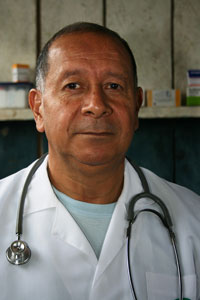 Being 54, Dr. Pablo says that he is very satisfied with the job he has done for about 24 years. After he graduated from medical school at “Universidad Central del Ecuador” in Quito City, he found a job in the oriental region of the country, in the jungle. That place had poor infrastructure and only a few means of communication.
Being 54, Dr. Pablo says that he is very satisfied with the job he has done for about 24 years. After he graduated from medical school at “Universidad Central del Ecuador” in Quito City, he found a job in the oriental region of the country, in the jungle. That place had poor infrastructure and only a few means of communication.
“I’m one of the few doctors who likes getting into the jungle. I’ve found many things here, like loads of peace and tranquility. It’s very different here; our patients are very different from the ones in the big cities.”
Patients from these remote regions are naturally shy and don’t trust much in others. Besides, there’s the language barrier: Dr. Pablo speaks Spanish, but the parents of the children he assists mainly speak Achuar or Kichwa. They can only speak some basic words and phrases in Spanish. Dr. Pablo relies on them for information about the kids’ health conditions.
All these factors have convinced him that this is quite an interesting experience. He gets to share with these people and discover the health problems of the zone. He also works with the support of the child development director, who in this case is fluent in both languages.
The truth is that organizing a doctor’s visit to the majority of communities located in the Ecuadorian jungle is not an easy task at all, and Ecuador for Christ Mission is not an exception. That is why Dr. Pablo’s team is constantly trying to set priorities in the usage of the few resources they have in stock and work hard to optimize them.
This is an alliance between two institutions that decided to coordinate their efforts to accomplish their mission and not duplicate certain actions. Instead, they help each other.
Compassion International works with Dr. Daniel, a representative of “Ecuador para Cristo” Mission, who has worked with people from the jungle for several years as well as the Ministry of Public Health works through Dr. Pablo.
“Dr. Daniel coordinates medical check-ups for all the sponsored children, Compassion provides us with the flights, and the Ministry of Public Health offers vaccines, medical attention and medicines,” Dr. Pablo says.
But this very attention is crucial in the cases of many boys and girls from the mission, which by the way is in charge of over 446 children distributed in 13 communities; Charapacocha is one of them. Dr. Pablo says,
“Compassion projects are the only ones at the present time that offer school health exams and check-ups in a practical way to children in the jungle. That’s a great thing since these kids don’t have any other chance to be checked by any other doctor.
When we first get to the communities, if there are any people with serious diseases we work with them immediately. Then we focus on the medical charts and the check-ups for sponsored children. After that, we give attention to the rest of the community.
We assist anyone who may need health care, even though they are not part of Compassion. We are here for every single person in need of medical attention and not just for an exclusive group of people.”
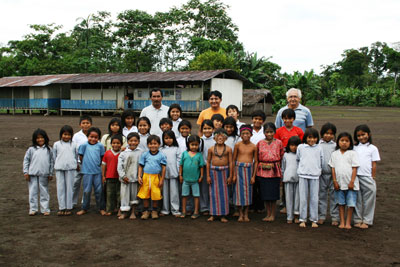
Health exams in school is a benefit for boys, girls and adolescents from 6 to 18 years old. They get their height, weight, development of motor skills and their sight assessed. These kids’ ears, nose, thyroid, heart, lungs, abdominal area, arms and legs are checked, too. Then the doctor creates a chart for each child and decides the most accurate treatment, if necessary. Dr. Pablo assures,
“We care for children’s constant well-being. We work in accordance to our possibilities, as the costs of the light plane flights are amazingly high. Of course, we use that resource when we have to. If any child is seriously ill, he or she leaves the community with us; if not, we can always delay the treatment until summer vacation in certain cases.”
Fortunately, they have faced serious health emergencies only a few times. However, these communities always present a wide variety of needs waiting to be covered — sight deficiency, trauma, lacerations, malnutrition — and as a consequence of the latter, even learning problems. There are also skin diseases and many parasites.
The problem with parasites, for example, has a very peculiar characteristic in this community. The people are used to consuming “raw” (non-boiled) water, and that’s an important part of their culture and worldview. Achuar people consume raw water because they think it is “alive.” So, it’s not easy to convince them to boil the water they are going to drink or use to prepare their meals.
Instead of trying to change their culture, the alternative is to teach them to collect water that is “alive,” but doesn’t have any parasites. Another option is to fight parasites with medication. This is why Dr. Pablo prepares enough anti-parasite doses before every visit and gives them to all the children who go to school in each community.
In the case of malnutrition, parasites affect children’s height and weight. Between 5 and 10 percent of the child population of these communities present this health problem. So, the presence of a doctor in this area is mandatory. This is also an opportunity to teach parents about topics related to nutrition. According to Dr. Pablo,
“These people need to consume more proteins than carbohydrates. We always suggest them to take advantage of the vegetable protein they can find in beans and “chonta” fruits (the latter comes from a sort of palm tree from the jungle), which are products they plant here.”
Sadly, Charapacocha and other indigenous communities from this region have lost their main protein sources, like fish and wild meat. As a consequence, people must travel to find good places for fishing and hunting. It’s Compassion’s job to reeducate and guide them towards eating nutritious food again.
Of course these general check-ups couldn’t be carried out without the participation of children and their parents, as they give important information about each family, previous health problems, certain habits and even domestic issues. This is how the medical team gets the whole picture about the recurrent health problems in each case, and then defines strategies to fight them.
To Dr. Pablo, the single fact of assisting these children in the health area is very important, since they live in really inaccessible areas:
“I think Compassion’s work is admirable as they support the neediest and most vulnerable people. In this particular case, they help children who cannot access to health services due to the long and hard distances in the jungle, or due to their lack of economic resources. Compassion works with unprotected human beings.”
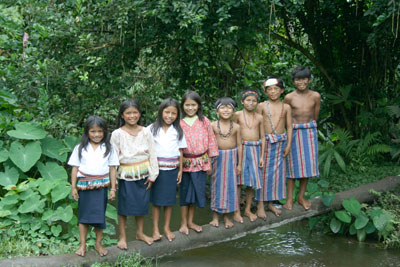
This admirable work of service and love is rewarded through the response of the boys and girls, who welcome them with affection. Julisa, 8, has lost the infamous fear of doctors. About Dr. Pablo she says, “I like him and I’m not afraid of him. The doctor is a nice person and is friends with us.”
Raul, 18, says, “I got malaria two years ago. The doctor came here and gave some medicines to me. The illness went away . . . now the doctor says that I have a skin problem, so he gave me a cream. I have to apply it around the eyes and all over my arms to get well. I truly believe I’m going to feel better after using the medicine the doctor gave me.”
And it’s not only children who recognize the significant part a doctor plays in their lives. Rossana, a mother from this community, says that “I’m thankful in God’s name because we don’t have much here, and there’s nothing we could do in the event of a serious disease.”
Eduardo, a father from the community, has his own big reasons to be grateful: “My daughter, Janeth, wouldn’t be alive right now because I didn’t have enough money to take her out to the hospital,” he says. “She had pneumonia in 2004, but Compassion helped me. I’m thankful to them and just want to say “Maketai” (Thanks!).”
Dr. Pablo has heard many “Maketai” from boys, girls and parents in Charapacocha. He feels nothing but satisfaction after complying with his job, a job he truly loves, and can only answer with a big smile: “¡Warinchuitiai!” (You’re welcome!).
The Achuar People*
The Achuar people are an ethnic group from Ecuador. They live in the higher basin of the Pastaza River, in the provinces of Pastaza and Morona Santiago. Their mother tongue is Achuar. Today there are 6,000 Achuar people in a total of 64 communities. The Achuar people existed long before the arrival of the Spaniards in 1520. They could defend their territory and culture from the foreign conquerors because they were strategically located very deep in the jungle. The Achuar people still maintain many of the survival practices that were born with them hundreds of years ago. At the present time, they combine the usage of wild plants and their hunting as well as fishing and agriculture activities with products they bring from the city, such as salt, batteries, clothes, guns, bullets, kitchenware, lighters, school supplies, and so forth.
*Source: www.nacionalidadachuarecuador.org

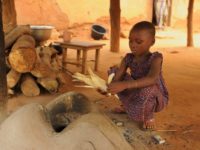
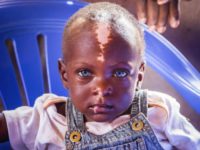
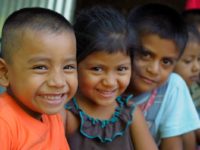



6 Comments |Add a comment
This is heartwarming. I hope that there are more doctors like him because we certainly need them.
I was so happy to read about Dr. Pablo’s work and the combined resources of different organizations to help these communities. I was very humbled and happy to read Dr. Pablo’s words “We assist anyone who may need health care, even though they are not part of Compassion. We are here for every single person in need of medical attention and not just for an exclusive group of people.” It is wonderful to see entire communities able to receive help, to see resources being used so wonderfully that even those not registered with Compassion receive care.
I am humbly grateful to Dr.Pablo. My little boy, Jonatan is in Quito. I am sure he has benefited greatly from Dr. Pablo’s love and kindness, as well as his expert care.
Thank you. Dr. Pablo
I’m so glad the children get the medical attention they need and the gentleness every heart needs!
Thank you for sharing this story with us. It is so wonderful to hear how Compassion is meeting the needs of children and families that would otherwise be forgoten! God Bless!
I love postings likes these! It is fascinating, and I learn so much about the children Compassion helps all over the world. Thank You!